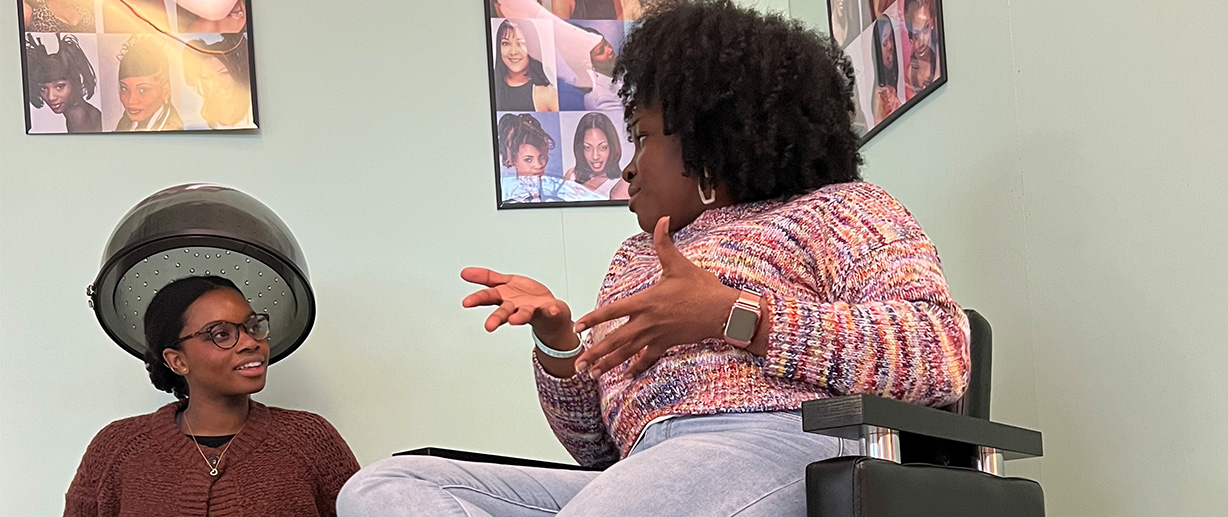An evening last year watching comedian Chris Rock’s 2009 documentary “Good Hair” led Dieran McGowan ’22 and Fadzai Mushayamunda ’22 to develop an independent study project focused on the ways hair has shaped the social and historical experiences of Black women.
Rock’s joke about actress Jada Pinkett Smith’s short hair during last Sunday’s Oscars’ ceremony also reflects what their research noted.
“Is hair just hair was our question going into this,” says McGowan, a finance major from Taylors, South Carolina. “The answer is no.”
Their project is titled “Knot Just Hair: Celebrating and exploring Black hair in a society where it is frequently misunderstood.” It’s a play on words to indicate that they are talking about more than hair.
They read the work of others focused on Black hair, visited the National Museum of African American History and Culture in Washington, D.C., and led campus roundtable discussions. They also challenged themselves to learn more about their hair and tested the reactions they would receive when experimenting with it.
They found that hair shapes peoples’ feelings about themselves and was often a status symbol before slavery. It was common for enslaved people to have their heads shaven. They also discovered how people often feel pressure to choose hairstyles based on societal expectations, especially for employment.
“If you don’t feel comfortable with who you are, nothing really matters,” says Mushayamunda, a humanities major from Winston-Salem, North Carolina, who wore an afro once during the project instead of her usual braids. “It was weird having shorter hair and it was very empowering.”
McGowan wore a mohawk one day and blue hair on another.
“If anyone had anything negative to say, they didn’t say it to me,” McGowan says. “My confidence increased significantly during this research period.”
The U.S. House of Representatives passed the CROWN (Creating a Respectful and Open World for Natural Hair) Act on March 18. It aims to end discrimination based on people’s hair texture and style of hair. The legislation moves to the U.S. Senate next.
“There’s so much anti-Black policy,” Mushayamunda says. “It was difficult to read about that and to see the statistics behind it.”
Those statistics include 42 states with laws that don’t protect citizens from discrimination based on how they wear their hair.
“We discuss many significant topics like culture, identity, history, stigmas, the politics and policing of Black hair and, most importantly, I think, the empowerment that comes from understanding difference while embracing and feeling confident about your own cultural identity,” says Dr. Camille Bethea, chair of the department of modern languages and professor of Spanish, who served as their faculty advisor. “During our conversations about their research, Dieran, Fadzai and I realized what a unique experience this was since it was our first time discussing these topics—that we encounter daily and that are so much a part of our own cultural identity—in an academic setting with this level of detail and candor.”
Rock’s documentary explored how hair has impacted the Black community, including people’s self-esteem. Mushayamunda was disappointed by Sunday night’s joke.
“I was very surprised that Chris Rock, the man that produced ‘Good Hair,’ would make such an offensive comment,” Mushayamunda says. “I think that it just goes to show us that even in today’s world, there is so much more work that needs to be done. This is also coming right after the House passed the CROWN Act as well, which shows that even though laws are changing, the stigma still remains. Women are being hyper-masculinized for deciding to wear their hair in a way that doesn’t fit Eurocentric beauty standards.”
McGowan earned her degree after Interim and plans to participate in May’s Commencement exercises. Mushayamunda graduates in May. McGowan would like to work on efforts to support the CROWN Act during a gap year. Mushayamunda plans to work in journalism before pursuing a postgraduate degree.
McGowan and Mushayamunda’s independent study project is one of about a dozen that were focused on research during Interim 2022.
“It has been a great opportunity and a privilege for me to witness students exploring, discovering, and wrestling with many research topics and discussing possible connections with the liberal arts and how this knowledge might be applied and helpful to individuals and our communities,” says Dr. Ramon Galiñanes Jr., director of undergraduate research and post-graduate fellowships.
Watch this documentary created by McGowan and Mushayamunda. It was directed and edited by Yasmin Lee ’23, a studio art major from Columbia, South Carolina. Lee received the “Best Direction” award for the documentary during the 2022 Wofford Film Festival.
